Uncle Green’s Grand “Experiment” At 25: An Oral History
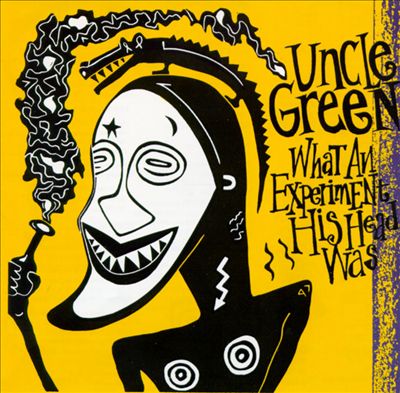 “’What An Experiment His Head Was’ was the moment where we went from black and white to color,” reflects Uncle Green singer-songwriter Matt Brown. On the Atlanta rock quartet’s fourth album (and final release on Atlanta-based indie label DB Recs before landing a deal with Atlantic Records), Uncle Green finally fused the excitement of their live sets with a shimmering studio sophistication befitting the band’s advanced songwriting. Working with DB Recs producer Brendan O’Brien (the future Grammy winner who would go on to produce Pearl Jam, Stone Temple Pilots, Bruce Springsteen, Neil Young and My Chemical Romance), Brown, singer-songwriter Jeff Jensen, bassist Bill Decker and drummer Peter McDade knocked out the record in just two weeks at Atlanta’s Southern Tracks studios.
“’What An Experiment His Head Was’ was the moment where we went from black and white to color,” reflects Uncle Green singer-songwriter Matt Brown. On the Atlanta rock quartet’s fourth album (and final release on Atlanta-based indie label DB Recs before landing a deal with Atlantic Records), Uncle Green finally fused the excitement of their live sets with a shimmering studio sophistication befitting the band’s advanced songwriting. Working with DB Recs producer Brendan O’Brien (the future Grammy winner who would go on to produce Pearl Jam, Stone Temple Pilots, Bruce Springsteen, Neil Young and My Chemical Romance), Brown, singer-songwriter Jeff Jensen, bassist Bill Decker and drummer Peter McDade knocked out the record in just two weeks at Atlanta’s Southern Tracks studios.
Indulging the band’s obsession with all things ‘60s, O’Brien managed to locate a semi-operational Mellotron for the boys to noodle around with. O’Brien (nicknamed Bud by the band) and the “free love” era instrument became the unofficial fifth member of the group as the recording sessions progressed.
“Our prior album ‘You’ was essentially an approximation of the band’s live sound,” explains Brown 25 years on. “But on ‘Experiment’ we upped the ante with the production and added lots of color and diversity of styles. It’s the moment we found our feet.”
While the quartet disbanded after the 1995 album “Vulture” recorded as 3 Lb. Thrill (also produced by O’Brien) for Sony Music, Uncle Green has occasionally reunited for one-off shows. Most recently, the band played a thank you concert in 2012 for fans who funded the successful Kickstarter campaign that rescued and released the band’s long-lost final album, “Rycopa” 14 years after it was recorded.
To celebrate the 25th anniversary of “What An Experiment His Head Was,” a reunited Uncle Green will play the record in its entirety, along with other favorites from the band’s seven-album catalog this Saturday night, April 2 at The Earl in East Atlanta Village. A few tickets still remain.
In an Eldredge ATL exclusive, the band, along with their longtime friend and former DB Recs Boy Friday Steve Pilon, reflected on the making of and reaction to “Experiment,” how they rate the LP’s songs today and what they tell their kids about the album’s closing masturbatory masterpiece, “Jack-A-Drum.”
How did the album’s title and George Davidson’s now-iconic cover artwork come about?
Steve Pilon, former DB Recs staffer: The band gave us a list of potential album titles. [DB Recs founder and namesake] Danny [Beard] looked at it for about eight seconds and zeroed right in on “What An Experiment His Head Was.” He said he even had the perfect cover art and pulled that illustration out of somewhere. And it really was perfect. No further discussion was necessary. The record holds up incredibly well. It definitely stands the test of time. I wouldn’t change a single thing about it. But 25 years later, I still have no idea what [the last line in the first verse of lead-off track “I Always Knew You’d Come To Me”] “heap big mistake” means.
What’s been the toughest “Experiment” song to re-learn after 20-plus years?
Matt Brown, singer, guitarist, songwriter: The toughest song for me to re-learn is a toss up between “Guilty Party” and “Ephenus,” reason being that we rarely-to- never played either of those songs live back in the day. The others came back very quickly, thanks to muscle memory. But those two really never got ingrained in my fingers, so it’s like learning a new song entirely, practically.
Peter McDade, drummer: This assumes I have already begun practicing. Future Pete will probably find “Ephenus” and “Guilty Party” trickiest to re-learn, because those never became the live warhorses that some of the others did. At least I don’t have to sing “Ephenus,” though.
Bill Decker, bassist, pianist, vocals: One week out, and I have not yet made the decision to sit down and actually do the re-learning. I am relying on muscle memory and my reserves of old fashioned pluck. The current plan is to outsource any actual difficult to play parts to guest musicians, so I’m feeling pretty good.
Jeff Jensen, singer, guitarist, songwriter: Theoretically (as I embark upon remembering songs soon!) I bet it will be “Guilty Party,” one of those Matt songs where he just decided to write all these little note parts that don’t seem to correspond to anything in particular. All rote muscle memory. Also, it was left off of the first batch of cassette tapes. I remember Danny Beard hearing this and just shrugging and saying, “Run it again.” There went any hope of making any money at all!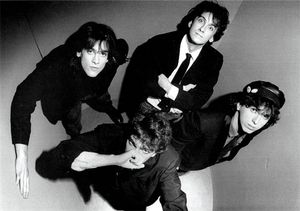
What’s one memory from the album’s recording sessions with producer Brendan O’Brien at Atlanta’s Southern Tracks recording studios that sticks out in your mind?
Matt Brown: The biggest addition to the band’s sound on the album was the use of the Mellotron. Brendan was very excited to have located a real one for us to use, and I recall him playing a bunch of classic songs on it, like “Strawberry Fields” and “Stairway to Heaven.” We all sat around playing with it and marveling at it for hours. The thing constantly needed repairs and fixes, but it was so worth it. It’s still pretty much my favorite flavor to add to recordings.
Peter McDade: We spent so much time at Southern Tracks with Bud that the sessions do get a little mixed up in my head, sometimes. I vividly remember meeting his new Mellotron, though, and instantly falling in love with it — as perhaps you can hear on the record, yes? I also remember setting up to “I’m Going Down” acoustic, all at once, inspired by “Gallows Pole.” And sitting in the lounge, reading Mix magazine as I listened to everyone else finish their tracks—as drummers do in studios all across the world.
Bill Decker: Brendan’s kids came by the studio one evening, and his oldest daughter was having a single digit birthday (I think 6). She was wearing some kind of homemade paper birthday crown, and I thought I would try to buddy up by asking if I could wear it. She replied with a serious “no” and a slightly suspicious look that said “that was off-putting.” At that point in my life, I thought of myself as someone who had a bit of a facility with children, and this moment made me re-evaluate a little. Also, we ate at Dalt’s on Buford Highway a few times. It was a TGIF owned spin-off, and I recall really liking it. I don’t think that would be case anymore.
Jeff Jensen: The glory of the Mellotron. It took all of our dreams of being a ‘60s rock band and made them real. It was incredibly temperamental and Bud used to play that thing like a virtuoso, tapping the wheel to slow it down and speed it up to change the pitch of the notes. Boy, I love that instrument.
Steve Pilon: We knew before they even finished the album that it was going to be tremendous. Every song was amazing, and the band was firing on all cylinders. Brendan had really figured out how to make them sound great in the studio too. It was really exciting to see everything we’d been working toward for the previous few years start to come together so perfectly.
Which songs from the “Experiment” album continue to hold up (or not!) in 2016?
Peter McDade: I’ll always think of “I Always Knew You’d Come to Me” as one of our high points, even after years of playing it. And playing it. It does a great job of revealing what some cool production touches could do to a classic Matt song: strong melody, tortured narrator. “Don’t Fix It If It Works” does the same thing for Jeff’s writing: layers of production on top of a song built around a cool riff and hooky, enigmatic words.
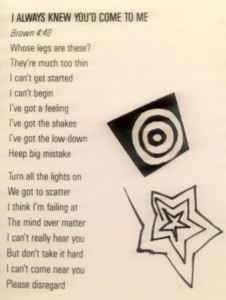 Matt Brown: “I Always Knew You’d Come to Me” and “I Don’t Wanna Know About It” have long been songs of the band’s that I put at the top of the heap. There’s something about them that’s so painfully honest and relevant to this day for me. It’s the sort of thing where I exposed more about myself than I probably meant to expose, which is frightening, but also exactly what I aim for. Those songs revealed things to me that I hadn’t intended them to, and that kind of revelatory songwriting is what it’s about for me. In fact, if a song or recording doesn’t surprise me, I consider it something of a failure. Those two songs, along with hard-rocking surrealist tracks like “Don’t Fix It If It Works” pretty much defined the sound of the band from that moment forward.
Matt Brown: “I Always Knew You’d Come to Me” and “I Don’t Wanna Know About It” have long been songs of the band’s that I put at the top of the heap. There’s something about them that’s so painfully honest and relevant to this day for me. It’s the sort of thing where I exposed more about myself than I probably meant to expose, which is frightening, but also exactly what I aim for. Those songs revealed things to me that I hadn’t intended them to, and that kind of revelatory songwriting is what it’s about for me. In fact, if a song or recording doesn’t surprise me, I consider it something of a failure. Those two songs, along with hard-rocking surrealist tracks like “Don’t Fix It If It Works” pretty much defined the sound of the band from that moment forward.
Bill Decker: “By The Way” was always kind of the quintessential Uncle Green song to me, and I still like it. Someone else had to point out to me in later years how often we did call-and-response style vocals, which I never thought of as any kind of “signature” but I guess they were. It also has two separate singing sections and a guitar break done in octaves. Is that an overuse of octaves? I don’t believe it is.
Jeff Jensen: “I Always Knew You’d Come to Me” and in 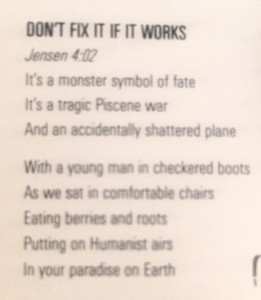 particular how it was recorded still sounds great to me. It builds really well and the ending that just churns along was so organic in how it came together. One of my faves out of the whole catalog. What doesn’t hold up? “Ephenus.” Who do I think I am, Roy Orbison?
particular how it was recorded still sounds great to me. It builds really well and the ending that just churns along was so organic in how it came together. One of my faves out of the whole catalog. What doesn’t hold up? “Ephenus.” Who do I think I am, Roy Orbison?
Steve Pilon: In the original track listing, “I Always Knew You’d Come To Me” was buried late in the album. I pushed for it to be the opener because I thought it sent a clear signal right there in the first 10 seconds that this album was a bold step forward for the band. We thought right away that “I Don’t Wanna Know About It” was going to be the single. And it did do really well on college radio. Commercial radio wasn’t something we were able to crack open in any meaningful way though. We got a little bit of play here and there, but Uncle Green should’ve been huge.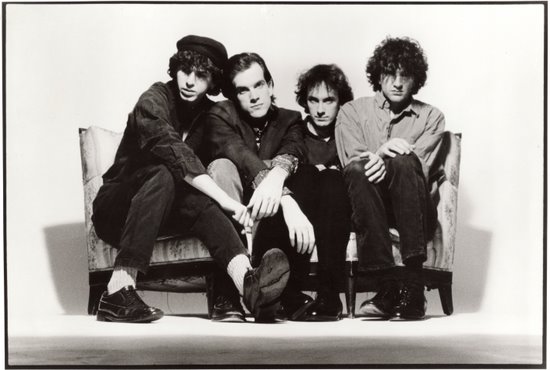
In retrospect, how did “What An Experiment” mark a turning point for the band?
Peter McDade: It was a turning point in many ways, which is why I’m so glad we’re doing the show. “Experiment” was the record where Matt and Jeff thought more about how best to produce each song, without worrying about how it could be reproduced live. In other words, the records themselves began to be the focus, as opposed to how the band sounded onstage. It was also a turning point for the band psychologically. This was the time period where we really stopped worrying about when our career would start, how we would get to that mythical land of major labels and awkward “Tonight Show” introductions. We realized that we were, in fact, having a career, and that it was best to just focus on what we were doing now instead of obsessing about what would or wouldn’t happen next.
Bill Decker: It was the last time (until the nothing-to-lose recording of the band’s final album “Rycopa”) that we were recording without a whole lot of thinking about career-type things. Kind of the end of the younger, “rising action” portion of our music career, when all the momentum seemed to point forward and upward only.
Jeff Jensen: Well, it got us our [major label] record deal [with Atlantic Records] which now seems so silly in retrospect. We were always better when there wasn’t some outside thing to be striving for and this album encapsulates that. It was an artistic high point for us that summed up who we were that I don’t think we reached again with any consistency until “Rycopa” where we knew we were doomed.
Matt Brown: I don’t think we felt as satisfied that we had pushed ourselves to new places or revealed our truest selves with a recording again until “Rycopa,” which we finished some 20 years later!
Now that you’re parents, how have you explained the album’s closer, “Jack-A -Drum,” (a song that may or may not be about self pleasuring) to your offspring?
Jeff Jensen: My kids don’t know I was in a band yet. I am getting to it.
Peter McDade: I’m waiting for them to go ahead and explain it to me.
Bill Decker: It has not come up in any fashion. Also, it is self-explanatory.
Matt Brown: My kids are utterly unfamiliar with my past life. At 11 and 6, they know Daddy is a musician and a songwriter who is constantly recording music in his bedroom, but they don’t really get what I used to do with my life. I assume it will get more interesting to them as they get older. Or maybe they’ll still be more interested in Minecraft.
A reunited Uncle Green will perform “What An Experiment His Head Was” in its entirety plus fan favorites this Saturday, April 2 at The Earl in East Atlanta Village. Doors open at 8:30 p.m. and Paul Melancon and the New Insecurities (with Pete McDade on drums) will open the show. You can get tickets here.

Richard L. Eldredge is the founder and editor in chief of Eldredge ATL. As a reporter for the Atlanta Journal-Constitution and Atlanta magazine, he has covered Atlanta since 1990.

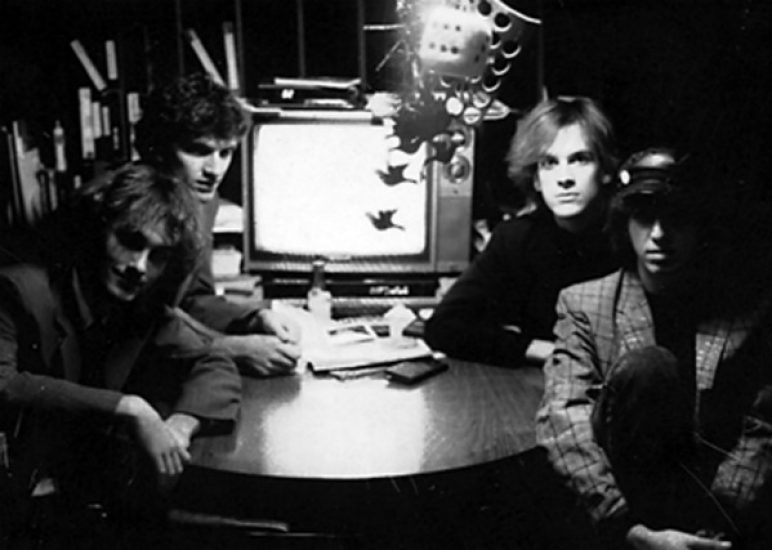



'Songs by Honeybird': Two Uncle Green Bandmates Reunite for Peter McDade's New Southern Rock Fueled Novel - Eldredge Atlanta
March 28, 2022 @ 7:01 pm
[…] the creative process immeasurably that McDade’s childhood pal is also Jeff Jensen, his longtime Uncle Green […]